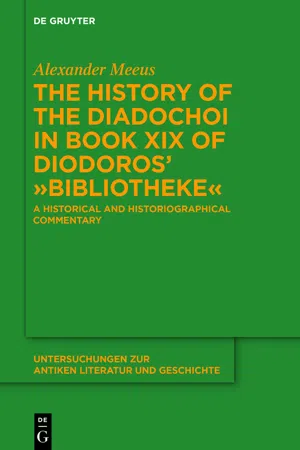2.1 Diodoros’ Conception of History
The one aspect of history that Diodoros stresses most strongly in his preface is its didactic and moral utility: to him history is not just a teacher for life, but the very best there is – ‘the metropolis of all philosophy so to speak’.20 It is obvious throughout the Bibliotheke that this was not a mere rhetorical topos and that Diodoros puts the idea into practice consistently.21 The reader of the account of the Successors in Book XIX regularly encounters the moralizing teacher: at times very conspicuously and at times rather in the background, but he is always there.22 Furthermore, it is clear that the selection of material is strongly determined by Diodoros’ moral programme (cf. infra, §2.2.3). From the point of view of the modern historian, then, Diodoros does in many ways have ‘unfortunate historiographical objectives’,23 but they are surely no sign of intellectual laziness or a profound historiographical failing.24 Indeed, well into the eighteenth century moral didacticism was considered history’s highest function,25 and Diodoros was appreciated as an historian by some of the greatest minds in early modern Europe.26
For Diodoros history is much more than a storehouse of useful examples (cf. I 1.3 – 5, χρηματιστήριον), however. He knows full well that the historian is required to present the truth, not only because it reinforces the moral lessons, but also – it would appear – because it is an inherent quality of the genre.27 Furthermore, Diodoros (esp. I 3.2, 3.8) considers chronology to be of central importance to historiography,28 unlike Eunapios (F1 Blockley) who deems it irrelevant because it does not contribute to the moral function. While Eunapios’ criticism of chronological exactitude must not be overstated,29 his claim that it is pointless to know in what time of the year a noble deed was done, contrasts sharply with Diodoros’ regular use of such seasonal markers as ‘when the dog star was rising’.30 Diodoros is likewise very much concerned with narrative continuity and does not just offer a collection of miscellaneous examples or short biographies in which the historical setting is only of marginal relevance. As puzzling and unhistorical as certain aspects of Diodoros’ selection of material may thus appear, it is by no means devoid of historical spirit. Admittedly, the focus in his description of political and military events is often on virtue and vice,31 but we equally find much material that has no moral dimension and would conform to historicist understandings of historical relevance just as well.
2.2 Diodoros’ Historical Method
Diodoros is traditionally assumed to have been a slavish epitomator who rather mechanically copied a single source at a time, his own contribution being limited to the chronographic system (containing a great deal of mistakes) and some moralizing comments. The classical statement of this view is to be found in Schwartz’s article in the Realencyclopädie, which has remained very influential during almost the entire twentieth century.32 Even in the nineteenth century some had already argued that the work showed much more independence, but they were hardly heard, in spite of many sound and convincing arguments.33
In 1955 Palm showed by means of a thorough analysis that, throughout the Bibliotheke, Diodoros has actually imposed his own language and style on the source material. This was a crucial step towards a partial rehabilitation, even though Palm still ruled out any independence of thought.34 Shortly after Palm, however, Spoerri and Pavan argued that Diodoros did have his own ideas which are reflected in his work, while Drews showed that Diodoros might sometimes have used more than one source for the same period.35 In an important series of articles Rubincam demonstrated Diodoros’ independence in the conception and the organization of his work.36
These studies seem to have paved the way for works such as those of Sacks, Chamoux, Wirth and Ambaglio who went rather far in arguing that Diodoros was in all respects an independent author who was not as stupid as is generally thought.37 They have found wide acceptance since many scholars nowadays take Diodoros’ independence largely for granted.38 The latter tendency seems to have found its culmination point in an article by Sulimani who assumes that all references to sources in the Bibliotheke are primary citations by Diodoros, without even the least attempt to prove the point, and argues that Diodoros was an innovator when it comes to source-citations.39
Not everyone is equally convinced, however, as the traditional view has recently been reasserted in the strongest terms by Stylianou, or in a somewhat more moderate manner by Anson.40 A most interesting development is found in the views of Ambaglio who has now joined the side of those who deny any serious independence and quality to the Bibliotheke, rejecting some of his own earlier arguments.41 In recent years a middle view has developed, which argues that Diodoros, while staying close to his sources, should not be considered a mindless compiler without any originality at all.42 Particularly important in this respect are several studies demonstrating that Diodoros wished to be seen as a critical historian who has consulted eyewitnesses and documents and has travelled w...
